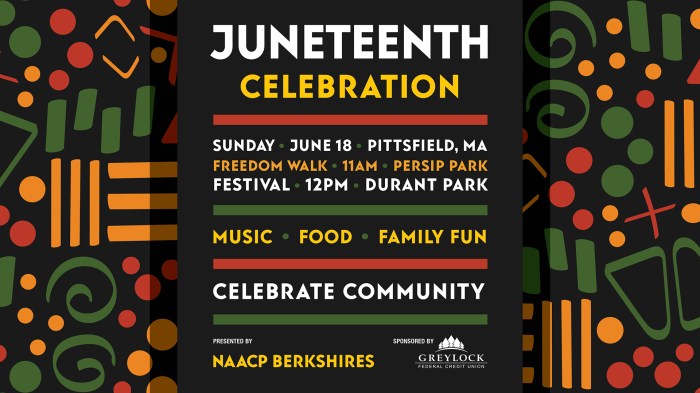Juneteenth Festival Piedmont Park: Atlanta’s vibrant Juneteenth celebration in Piedmont Park isn’t just a festival; it’s a powerful testament to resilience, freedom, and cultural richness. This annual event draws thousands, transforming the park into a dynamic hub of music, food, art, and education, all while honoring the historical significance of Juneteenth and its ongoing impact on the Atlanta community.
Understanding its evolution, from humble beginnings to a major city-wide event, reveals a compelling story of community growth and the enduring spirit of African American heritage.
Piedmont Park’s selection as the venue itself is significant, offering a spacious and iconic setting for this momentous occasion. The logistical challenges of hosting such a large-scale event are immense, requiring meticulous planning, effective resource allocation, and collaboration among numerous stakeholders – from organizers and sponsors to volunteers and city officials. The festival’s success hinges on this intricate web of coordination, resulting in a seamless and unforgettable experience for attendees.
History and Significance of Juneteenth in Atlanta: Juneteenth Festival Piedmont Park

Juneteenth, commemorating the emancipation of enslaved African Americans in the United States, holds a profound and evolving significance in Atlanta, a city deeply intertwined with the South’s history of slavery and the Civil Rights Movement. Understanding its historical context within Atlanta reveals a story of resilience, struggle, and the ongoing pursuit of racial justice.
Historical Context of Juneteenth Celebrations in Atlanta
Atlanta’s Juneteenth celebrations, while perhaps less widely documented than those in some other Southern cities, have deep roots in the city’s Black community. Early commemorations likely involved smaller, church-based gatherings and family reunions, reflecting the decentralized nature of early Juneteenth observances across the country. These early celebrations served as vital spaces for remembering the past, fostering community bonds, and reaffirming hope for a more equitable future.
The lack of extensive historical records for early Atlanta Juneteenth events underscores the need for further research and community storytelling to fully understand its origins. The absence of widespread documentation should not be interpreted as a lack of importance; rather, it highlights the often-unrecorded history of Black communities in the United States.
Evolution of Juneteenth Commemorations in Atlanta
Over time, Atlanta’s Juneteenth celebrations have grown significantly in scale and scope. Initially focused on smaller, localized events, they have evolved into larger, more organized community festivals, often featuring parades, musical performances, educational workshops, and speeches by prominent figures. This growth reflects the increasing national recognition of Juneteenth and the growing desire within the Atlanta community to actively engage with its history and legacy.
The transition from intimate gatherings to large-scale public events is a testament to the enduring power of collective remembrance and the increasing visibility of Black culture and history in Atlanta.
Comparison of Juneteenth Significance in Atlanta with Other Major US Cities
While the historical context of Juneteenth varies across different US cities, reflecting their unique histories with slavery and the Civil Rights Movement, Atlanta’s celebrations share common threads with other major urban centers. Like many cities with large Black populations, Atlanta’s Juneteenth events emphasize community building, cultural pride, and education about the history of emancipation. However, the specific cultural expressions and historical narratives may differ.
For instance, cities with stronger ties to specific historical events related to emancipation might highlight those narratives more prominently. Nevertheless, the shared goal of remembering, celebrating, and advocating for racial justice remains central to Juneteenth observances across the nation.
Cultural and Social Impact of Juneteenth Celebrations on the Atlanta Community
Juneteenth celebrations in Atlanta have a significant cultural and social impact. They provide a space for the Black community to gather, celebrate their heritage, and reaffirm their identity. The events serve as platforms for promoting Black artists, musicians, and entrepreneurs, fostering economic empowerment within the community. Furthermore, the educational aspects of many Juneteenth celebrations contribute to a broader understanding of Black history and the ongoing struggle for racial equality, fostering dialogue and promoting social justice within the wider Atlanta community.
Timeline of Important Milestones in the History of Juneteenth in Atlanta
| Date | Event | Key Figures | Significance |
|---|---|---|---|
| June 19, 1865 | Announcing of Emancipation in Galveston, Texas | Union Soldiers | Beginning of Freedom |
| Early 20th Century | Early, Smaller Juneteenth Gatherings | Atlanta’s Black Community Leaders & Families | Initial Community Remembrance and Celebration |
| Mid-20th Century | Growth of Juneteenth Observances | Church Leaders and Community Organizations | Increasing Awareness and Participation |
| Late 20th & Early 21st Century | Emergence of Large-Scale Juneteenth Festivals | Community Activists and Organizations | Increased Public Recognition and Community Building |
| Present Day | Continued Growth and Evolution of Juneteenth in Atlanta | Diverse Community Leaders and Participants | Ongoing Celebration, Education, and Advocacy |
Piedmont Park’s Role in Hosting the Juneteenth Festival

Piedmont Park’s selection as the venue for Atlanta’s Juneteenth Festival is a strategic choice, reflecting both the park’s historical significance and its suitability for hosting a large-scale public event. Its central location, ample green space, and existing infrastructure make it an ideal setting for a celebration that draws thousands of attendees. The decision underscores the importance of commemorating Juneteenth in a prominent and accessible public space within the city.The logistical undertaking of organizing a Juneteenth festival of this magnitude in Piedmont Park is substantial.
Careful planning and coordination are crucial for a successful event.
Permitting and Infrastructure, Juneteenth Festival Piedmont Park
Securing the necessary permits from the city of Atlanta is a fundamental first step. This involves navigating various departments, including those responsible for park usage, event permits, and public safety. The festival organizers must also address infrastructure needs, such as portable restrooms, water stations, power supply, and waste management systems. Adequate staging, sound systems, and vendor spaces must be strategically planned and implemented to ensure a smooth flow of activities and a comfortable experience for attendees.
Consideration must be given to accessibility for individuals with disabilities, ensuring compliance with ADA guidelines.
Stakeholder Collaboration
The Juneteenth Festival in Piedmont Park is a collaborative effort involving numerous key stakeholders. The primary organizers, often a non-profit organization or community group, are responsible for the overall planning and execution. Sponsors, ranging from corporations to local businesses, provide crucial financial support and resources. Volunteers play a vital role in various aspects of the festival, from setup and cleanup to assisting attendees and managing information booths.
City officials, including representatives from the Parks and Recreation Department and the Police Department, are essential partners, providing support and ensuring public safety.
Comparison with Other Juneteenth Festivals
Comparing the Piedmont Park Juneteenth Festival to similar events in other cities reveals both commonalities and unique characteristics. Many festivals share common elements such as historical reenactments, live music, food vendors, and educational exhibits. However, the specific programming, scale, and overall atmosphere can vary significantly depending on local context and resources. For example, a Juneteenth festival in a smaller city might be more intimate and community-focused, while a larger city’s festival might feature a more diverse range of activities and a larger attendance.
The unique aspect of the Piedmont Park festival lies in its location within a historically significant park, adding another layer to the commemorative event.
Promotional Campaign Design
A robust promotional campaign is essential for maximizing attendance and engagement at the Juneteenth Festival in Piedmont Park. The campaign should leverage a multi-channel approach to reach a broad audience.
- Social Media Marketing: Utilize platforms like Facebook, Instagram, and Twitter to share event information, photos, videos, and behind-the-scenes content. Run targeted ads to reach specific demographics.
- Website and Email Marketing: Create a dedicated website with detailed information about the festival, including a schedule of events, map, and ticketing information. Build an email list to send out regular updates and promotional materials.
- Public Relations: Secure media coverage through press releases, interviews, and partnerships with local news outlets. Highlight the festival’s significance and unique aspects.
- Community Outreach: Partner with local community organizations and businesses to promote the event. Distribute flyers and posters in high-traffic areas.
- Influencer Marketing: Collaborate with local influencers to promote the festival to their followers.
The Juneteenth Festival in Piedmont Park stands as a powerful symbol of progress and remembrance. It’s more than just a celebration; it’s a living testament to the ongoing struggle for equality and a vibrant showcase of African American culture. The festival’s economic impact on the local community is undeniable, bolstering businesses and strengthening community bonds. By understanding the historical context, logistical complexities, and community engagement, we gain a deeper appreciation for this vital event and its contribution to Atlanta’s cultural landscape.
The festival’s continued growth and evolution promise an even brighter future, ensuring that the legacy of Juneteenth remains a powerful force for positive change.